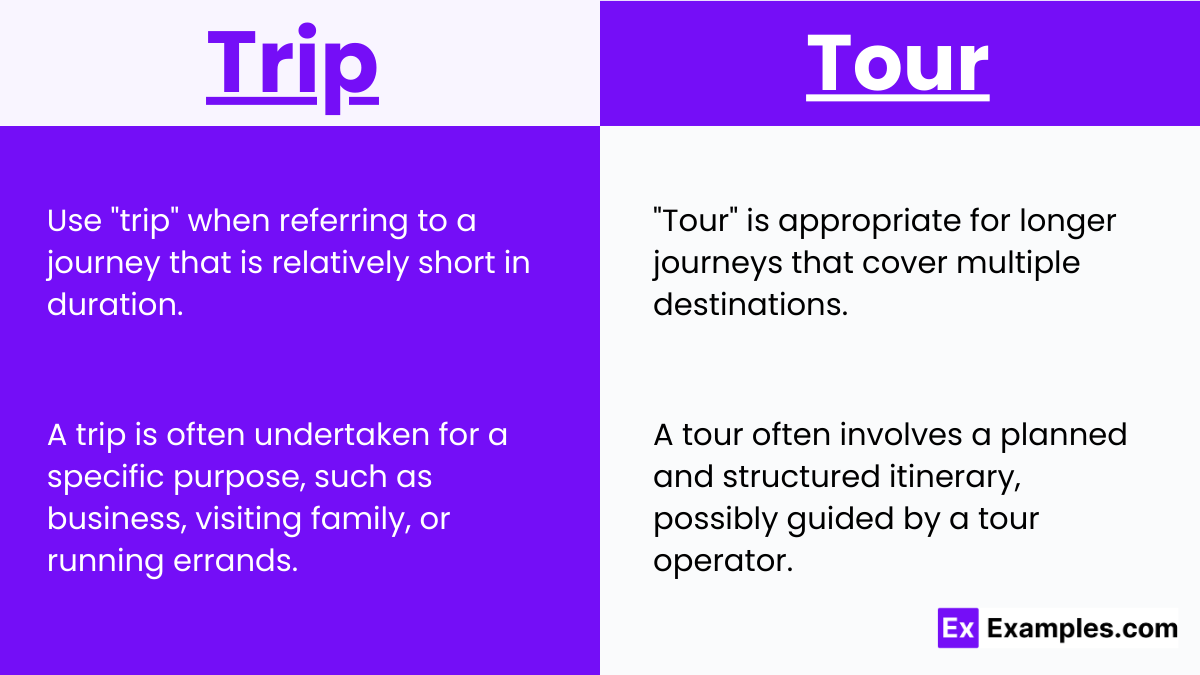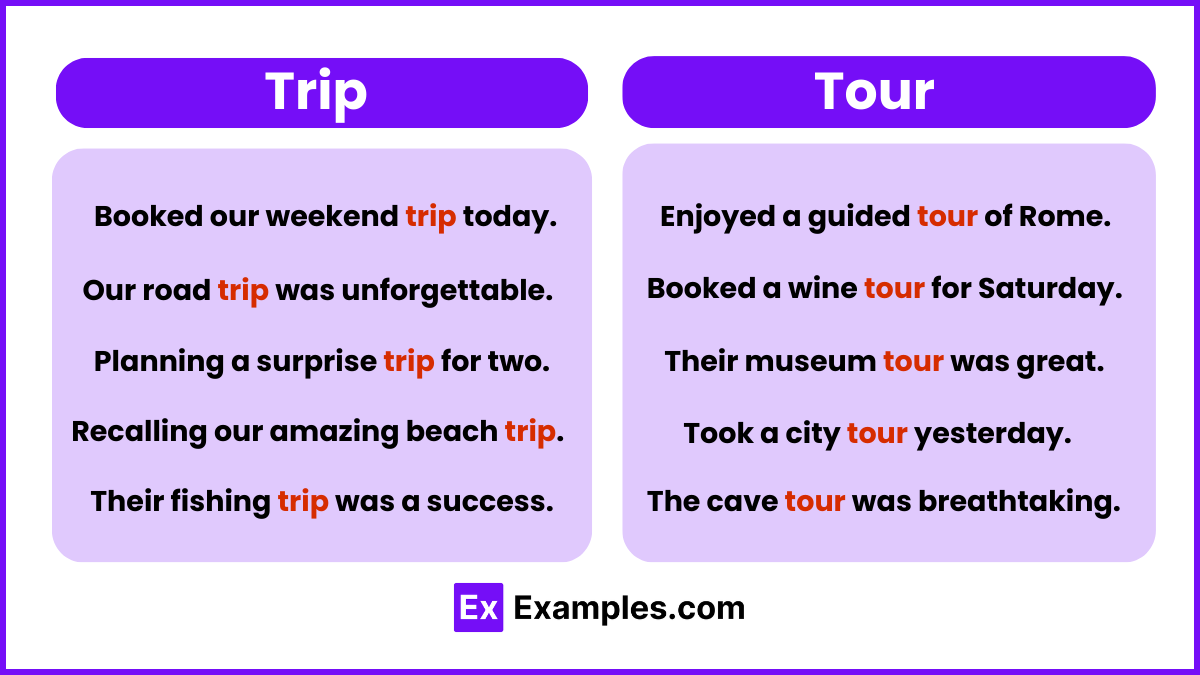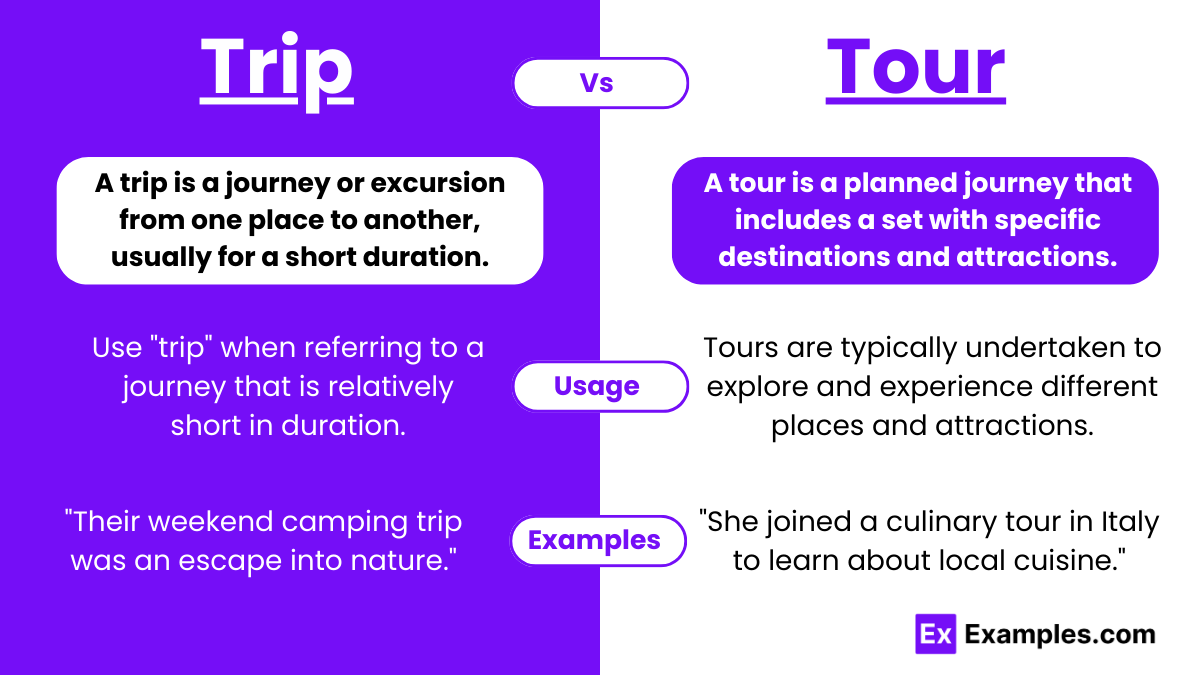Trip vs Tour
Ever puzzled over the difference between a trip and a tour? It’s easy to use these terms interchangeably, but they hold distinct meanings that can enhance your travel plans. Whether you’re a seasoned traveler or planning your first getaway, understanding these differences can help tailor your experiences. Let’s embark on a journey to demystify these terms, exploring their nuances from definitions to usage, and even how to remember their distinct characteristics.
Trip and Tour – Meanings
- Trip: A trip is a journey or excursion from one place to another, usually for a short duration and can be for various purposes such as leisure, business, or exploration. Trips are often more informal and can be spontaneous or planned. They offer flexibility, allowing travelers to customize their itinerary according to personal preferences.
- Tour: A tour is a planned journey, often organized by a company, that includes a set itinerary with specific destinations and attractions. Tours are usually guided and aim to provide a comprehensive experience of the places visited. They can cater to various interests, such as cultural, educational, or adventure tours, and are designed to offer an in-depth exploration with the convenience of pre-arranged logistics.
Summary
A trip is usually a short journey where the main goal is often leisure, adventure, or personal matters, and it can be planned or spontaneous. On the other hand, a tour is more structured, often involving a planned itinerary with specific destinations and activities, usually guided, and focused on exploring and learning about the places visited. While trips offer more flexibility and personal freedom, tours provide in-depth experiences with educational elements, often in a group setting.
How to Pronounce Trip and Tour
- Trip: Pronounced as /trɪp/ (trip).
- Tour: Pronounced as /tʊər/ or /tɔːr/ (toor).
The pronunciation of “trip” features a short “i” sound, making it crisp and quick. “Tour” can have a more rounded vowel sound, varying slightly depending on regional accents but generally maintains a longer vowel sound than “trip.”
Differences between Trip and Tour
| Aspect | Trip | Tour |
|---|---|---|
| Nature | Usually informal and can be spontaneous. | Well-organized and often guided. |
| Duration | Can vary greatly, from a day to weeks. | Often has a set duration, from a few days to a few weeks. |
| Planning | Planned by the individual or group. | Organized by a tour operator or company. |
| Flexibility | High, with personal itinerary choices. | Limited, follows a pre-arranged itinerary. |
| Experience | Personal and customizable. | Structured with a focus on comprehensive exploration. |
| Guidance | Self-guided, relying on individual research. | Often includes a tour guide or leader. |
How to Remember the Difference between Trip and Tour
To differentiate, think of a “trip” as a personal journey, emphasizing individual experiences and flexibility. Contrastingly, envision a “tour” as a curated exploration led by experts, providing an in-depth look at a destination’s highlights with the convenience of arranged details.
When to Use Trip and Tour

Usage of Trip
- Short Duration: Use “trip” when referring to a journey that is relatively short in duration, often lasting a few days or less. It implies a temporary excursion, like a weekend getaway or a day trip to a nearby town.
- Specific Purpose: A trip is often undertaken for a specific purpose, such as business, visiting family, or running errands. For example, a business trip involves traveling to a location for work-related activities.
- Less Formal: The term “trip” carries a less formal connotation, making it suitable for casual outings. It can be used for spontaneous or leisurely travel plans, like a road trip with friends.
- Single Destination: A trip usually involves traveling to a single destination and then returning. It’s straightforward, focusing on the travel aspect itself rather than the experience of exploring multiple places.
- Individual or Small Group: “Trip” is commonly used when traveling alone or with a small group of people. It emphasizes the personal or intimate nature of the journey, such as a family trip to the beach.
Usage of Tour
- Extended Journey: “Tour” is appropriate for longer journeys that cover multiple destinations. It suggests an extended travel period, such as a three-week tour of European capitals.
- Exploratory Purpose: Tours are typically undertaken to explore and experience different places, cultures, and attractions. For example, a sightseeing tour in a historic city aims to discover its landmarks and heritage.
- Structured Itinerary: A tour often involves a planned and structured itinerary, possibly guided by a tour operator. This can include guided tours of museums, historical sites, or natural wonders.
- Educational or Thematic Focus: Tours can have an educational or thematic focus, offering in-depth knowledge about a specific subject, like a wine-tasting tour in Napa Valley or an art history tour in Florence.
- Group Oriented: “Tour” is usually associated with group travel, where individuals join others to form a larger group led by a guide. This emphasizes the communal experience of discovering new places together, such as in a group tour to the Grand Canyon.
How to use Trip and Tour
Using “Trip”
As a Noun:
- “Trip” primarily functions as a noun, denoting a journey or excursion, typically for pleasure or business.
- Example: “Our weekend trip to the mountains was refreshing.”
As a Verb:
- When used as a verb, “trip” means to stumble or cause someone to stumble or fall, often figuratively to make a mistake.
- Example: “Be careful not to trip over the rug.”
- Figurative Example: “He tripped up during the presentation by forgetting the main points.”
Using “Tour”
As a Noun:
- “Tour” as a noun refers to a journey or trip taken for pleasure, exploration, or learning, often involving visits to several different places.
- Example: “We went on a guided tour of the ancient city.”
As a Verb:
- When “tour” is used as a verb, it means to travel through various places for pleasure, exploration, or the purpose of performance (in the case of musicians, actors, etc.).
- Example: “Next summer, we plan to tour Europe.”
- Performance Context: “The band is touring Asia this year.”
Additional Considerations
- Adjective Form: While “trip” and “tour” are not typically used as adjectives, descriptive forms can be created with phrases. For example, “trip-related expenses” or “tour guide services” use the nouns attributively to modify another noun.
- Usage in Different Contexts: The context can change the use of “trip” and “tour.” For example, in the digital world, a “virtual tour” of a museum uses “tour” in a non-traditional sense, describing an in-depth exploration of a place through digital means. Similarly, “road trip” as a compound noun emphasizes an adventurous journey by car, focusing on the experience of travel itself.
Trip and Tour – Examples

Examples of Trip
- Their weekend camping trip was an escape into nature.
- She often goes on solo trips to discover new cities.
- The annual family road trip is a cherished tradition.
- His business trip to New York was packed with meetings.
- They embarked on a cross-country trip to explore national parks.
Examples of Tour
- The guided tour of the museum was educational and engaging.
- Their European tour included several countries over three weeks.
- She joined a culinary tour in Italy to learn about local cuisine.
- The wildlife safari tour in Africa was a once-in-a-lifetime experience.
- The city tour provided a comprehensive overview of historic landmarks.
Synonyms
| Term | Synonyms |
|---|---|
| Trip | Journey, excursion, voyage |
| Tour | Excursion, expedition, safari |
Exercise
Fill in the blanks with either “trip” or “tour” to complete the sentences accurately.
- The family planned a __________ to the Grand Canyon during spring break.
- He signed up for a photography __________ to capture the autumn foliage in Japan.
- Their road __________ took them through several quaint towns along the coast.
- The __________ around the ancient ruins was informative and well-organized.
- For her honeymoon, she dreamed of a luxury __________ through the Greek islands.
Answers
- trip
- tour
- trip
- tour
- tour
FAQ’S
What is the difference between journey, trip, and tour ride?
A journey is any travel from one place to another. A trip is a short journey, while a tour ride involves guided exploration of various sites.
What is the difference between trip, journey, and voyage?
A trip is a short journey for pleasure or business, a journey covers any distance and purpose, and a voyage typically refers to long journeys by sea.
What is a tour in travel?
A tour in travel is an organized journey where one visits different places, often with a guide, focusing on exploration and experiences.
What is the difference between a ride and a trip?
A ride involves traveling in a vehicle, often short and direct. A trip is broader, referring to the act of traveling from one place to another.
Why is a journey called a trip?
A journey is called a trip when it emphasizes the experience of travel, typically for leisure, business, or a specific purpose, often of shorter duration.


